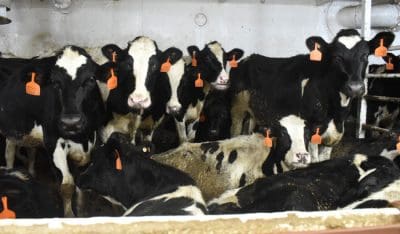Agricultura, Mexico’s Ministry of Agriculture and Rural Development, has confirmed it has received a second shipment of Australian live cattle for genetic improvement, bringing to 8014 the number of Holstein dairy cows imported since March.
Beef Central reported on the first shipment of 3019 cattle which arrived at the northwest port of Mazatlan from Portland, Victoria, in March.
The latest shipment of 4995 heifers arrived on April 21.
The cattle were transported to dairy farms in the states of Jalisco, Durango, Chihuahua, Guanajuato and Aguascalientes.
A further two shipments are scheduled for later this year, according to Agricultura.
Senasica, Mexico’s National Service for Agri-Food Health, Safety and Quality, and the Agriculture Ministry announced last week that the importation of the Australian cattle is part of an initiative to strengthen the genetic quality of the national cattle herd.
“These imports—inspected by Mexican officials in Australian territory—are the first and second of four shipments scheduled for this year under the agreement between Senasica and the Australian Department of Agriculture, Fisheries and Forestry,” a statement from Agricultura said.
To certify the health status of the batch of cattle, Senasica sent four veterinary zootechnicians (MVZ) to Australia, who verified the absence of pests and high-risk zoosanitary diseases in the 3,019 animals that formed part of the first shipment.
Likewise, at the end of March, expert animal health inspection personnel verified the health of the 4,995 cattle that made up the second import batch.
Senasica personnel verified the absence of diseases such as bluetongue, Akabane, Aino, bovine viral diarrhea, leukosis, trichomoniasis, infectious bovine rhinotracheitis, campylobacteriosis, dermatophilosis, anaplasmosis, anthrax, symptomatic carbon, malignant edema, paratuberculosis and bovine ephemeral fever among other diseases requiring mandatory notification.
Once the health requirements were met at origin, the cattle were shipped onto specialized vessels that left the port of Portland, Australia, and arrived 24 days later at the port of Mazatlán.
Agriculture said that upon arrival, Senasica personnel participated in the logistical tasks of receiving the animals, verified their integrity, and reviewed the corresponding documentation to authorise their ground transportation to breeding farms located in Aguascalientes, Guanajuato, Chihuahua, Durango and Jalisco.


Give a man a fish and you will feed him for a day,
Teach a man to fish and you will feed him for life.